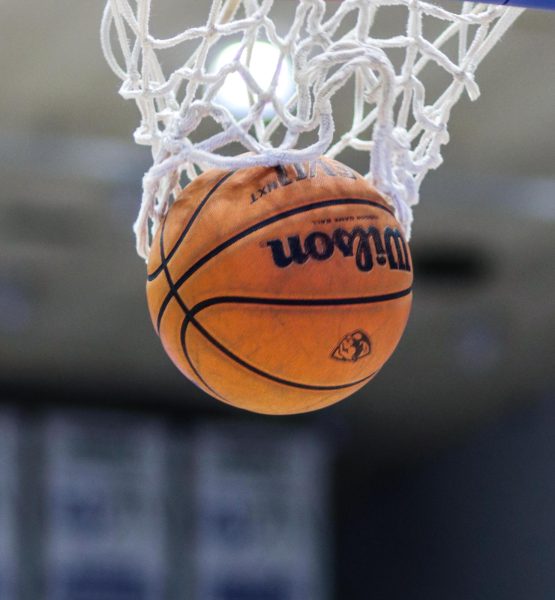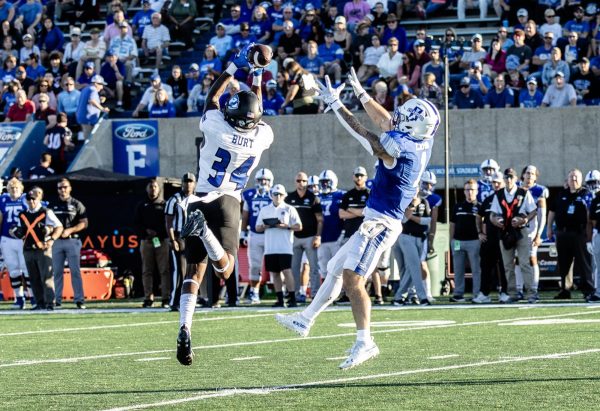Austin reflects on summer trip to Africa
Editor’s note: This is the first installment in a series about Eastern athletes in the offseason of their sport.
Alex Austin hovered over the hospital bed of a six-year old boy in Rwanda, Africa in June 2013.
“He was really skinny, but his chest was so enlarged,” Austin said. “You could just tell there was something wrong with him.”
The boy was no younger or less innocent than Austin himself once was.
“When I was his age, I was running around playing, and here he is in a hospital bed” Austin said.
The patient made the most of his situation, however.
“He had the biggest smile on his face, just waving at us and playing with a toy truck,” Austin said.
A doctor in the hospital who informed them about the boy’s condition then greeted Austin, a sophomore guard for the Eastern men’s basketball team, and a group of volunteers.
He was from a local village just up the road from the hospital, where he became subject to an abnormal heart condition from drinking infected water in his local village.
“I couldn’t help but feel sorry for him,” Austin said. “Nobody asks to be born in that situation.”
The boy was so ill that he could not physically walk from his village to the hospital. A fellow villager had to carry him down to the hospital, with hopes of being treated, the doctor said.
But the doctor knew the patient’s short timeline.
“If he doesn’t get the correct treatment, he will probably die in a month,” Austin said the doctor told the group.
Tears shed.
“I was tearing up,” Austin said.
Questions arose about why the child was not receiving the proper treatment immediately.
But it was not that simple.
The nearest medical center that was capable of performing the heart surgery the boy’s condition required was in Johannesburg, a four-hour flight to South Africa — which totaled to $15,000.
The boy is one of 10 kids with the same condition that come to the hospital daily, but the most doctors can do is provide them with medicine that keeps them stable for a limited amount of time.
The child’s family elected for him to have surgery, but being from an impoverished village, the family could not afford it all at once.
But luckily for the boy and his family, Austin was there with The Clinton Foundation, which presented him with the opportunity to travel to Africa to help with volunteer work.
The Clinton Foundation is a non-profit organization established by former president Bill Clinton with the stated mission to “strengthen the capacity of people throughout the world to meet the challenges of global interdependence.”
The Clinton Foundation focuses on critical areas: improving global health and wellness, increasing opportunity for women and girls, reducing childhood obesity, creating economic opportunity and growth, and helping communities address the effects of climate change.
The Foundation works with local physicians to address medical challenges, and despite surviving the surgery, Austin describes his visit to the hospital as one of his biggest life-changing experiences.
“That opened my eyes,” Austin said. “It’s not his fault, but he still had to deal with it.”
Austin also visited Malawi, Zambia, Tanzania, Zanzibar, Rwanda and South Africa where he was able to see firsthand exactly what environment the boy lived in during a one-week trip last June.
“The only way to take such a culture shock is to embrace everything around you,” Austin said.
The trip began in Malawi, where Austin witnessed how the villagers would provide for their families: the men grew their own food and the women walked miles to bring back water.
“You see the things on TV, but when you’re actually there in person, you get the full experience,” Austin said.
Austin had the full experience, except for those that were potentially life-threatening.
Austin was not allowed to use the water in the villages, the same water that made the boy in the Rwanda hospital sick.
“They told us not to even brush our teeth or shower with the faucet water because it’s not sanitary at all,” he said.
Instead, Austin and the rest of volunteers were given bottles of water to use for personal hygiene.
“I get to come to Eastern every day,” Austin said. “I have healthy water and food here. They don’t get that there. The poorest city in America is better than some cities over there, but we still take so much for granted here.”
Which has now led Austin to have the mindset that no matter how upset he is about something, there are other people in the world that victims to worse circumstances.
But the last lesson he was able to take away from the trip, and possibly the one that resonates most, was how everyone he met appreciated all that they had, despite not having the opportunities Austin has in the United States.
“They’re happy people because they appreciate their families and everything God has given them,” Austin said. “There’s so much more out there, but they were happy with how they were living.”
Anthony Catezone can be reached at 581-2812 or ajcatezone@eiu.edu.





































































